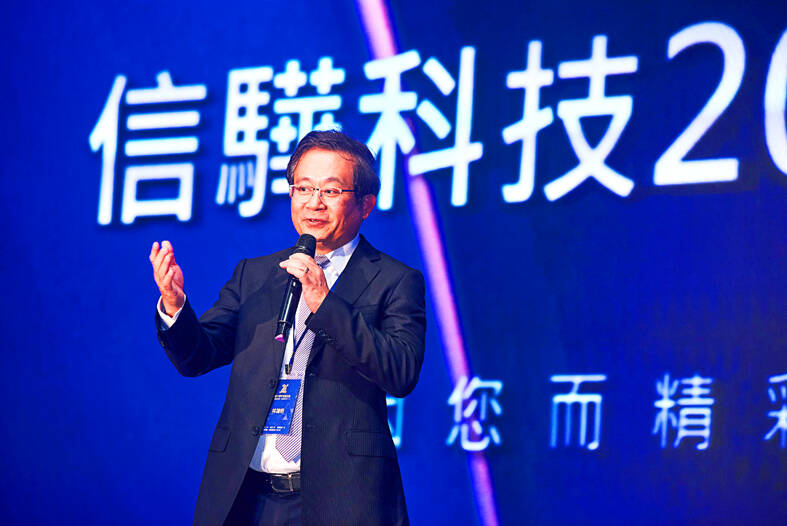Aspeed Technology Inc (信驊), which designs specialized processors used to remotely monitor and manage host systems, announced the launch of a research and development (R&D) center in Kaohsiung as a base for its southward expansion in Taiwan.
The company plans to set up the R&D center on the north side of Banana Pier at the Asia New Bay Area (亞洲新灣區), which is a new industrial, exhibition and cultural site in the port city, the company said in a news release yesterday, citing chairman Chris Lin (林鴻明) at an event celebrating the firm’s 20th anniversary on Saturday.
“Aspeed has taken root in Hsinchu for a long time, and we deeply feel the responsibility to help balance the nation’s north-south development in terms of the technology industry,” Lin said in the release.

Photo: Kaohsiung Economic Development Bureau
“We are quite confident in the development of Kaohsiung’s semiconductor industry and the overall investment environment. In the future, we will also rely on Kaohsiung’s outstanding local semiconductor and IC design talent to promote Aspeed’s development in southern Taiwan and continue to strengthen the firm’s industrial competitiveness,” he added.
The announcement came after the company, which is the world’s biggest supplier of baseboard management controllers (BMCs) used in servers, signed a memorandum of understanding (MOU) with the Kaohsiung City Government in May to establish a new operations base in the city.
A BMC is a specialized microcontroller embedded on the motherboard of servers and high-end computers to remotely monitor and manage a host system. Aspeed has benefited from the rising demand for BMCs driven by the growth momentum in artificial intelligence servers and edge computing devices in recent years.
During the first 11 months of this year, Aspeed raked in NT$5.72 billion (US$176 million) in revenue, an annual increase of 103.53 percent, company data showed.
Under the MOU, Aspeed plans to establish an exhibition center for its 360-degree immersive imaging solutions, called Cupola360, and continues to promote smart city remote patrol solutions. The company would also expand R&D and design capabilities in Kaohsiung in the future to strengthen its technical leadership, it said.
Kaohsiung Mayor Chen Chi-mai (陳其邁), who attended Saturday’s event, welcomed the company’s new investment, saying it would help promote the development of high-end technology in the city.
So far, leading semiconductor companies including Taiwan Semiconductor Manufacturing Co (台積電) and Winbond Electronics Corp (華邦電), as well as tech giants such as IBM Corp, Hon Hai Precision Industry Co (鴻海精密), Advanced Micro Devices Inc and Cisco Systems Inc, have established system software and R&D centers in the Asia New Bay Area, according to the Kaohsiung City Government.
In addition, Nvidia Corp has completed the construction of a supercomputer center in the Asia New Bay Area, while Hon Hai has announced that it would team up with Nvidia to build an advanced computing center there, the city government added.

Intel Corp chief executive officer Lip-Bu Tan (陳立武) is expected to meet with Taiwanese suppliers next month in conjunction with the opening of the Computex Taipei trade show, supply chain sources said on Monday. The visit, the first for Tan to Taiwan since assuming his new post last month, would be aimed at enhancing Intel’s ties with suppliers in Taiwan as he attempts to help turn around the struggling US chipmaker, the sources said. Tan is to hold a banquet to celebrate Intel’s 40-year presence in Taiwan before Computex opens on May 20 and invite dozens of Taiwanese suppliers to exchange views

Application-specific integrated circuit designer Faraday Technology Corp (智原) yesterday said that although revenue this quarter would decline 30 percent from last quarter, it retained its full-year forecast of revenue growth of 100 percent. The company attributed the quarterly drop to a slowdown in customers’ production of chips using Faraday’s advanced packaging technology. The company is still confident about its revenue growth this year, given its strong “design-win” — or the projects it won to help customers design their chips, Faraday president Steve Wang (王國雍) told an online earnings conference. “The design-win this year is better than we expected. We believe we will win

Chizuko Kimura has become the first female sushi chef in the world to win a Michelin star, fulfilling a promise she made to her dying husband to continue his legacy. The 54-year-old Japanese chef regained the Michelin star her late husband, Shunei Kimura, won three years ago for their Sushi Shunei restaurant in Paris. For Shunei Kimura, the star was a dream come true. However, the joy was short-lived. He died from cancer just three months later in June 2022. He was 65. The following year, the restaurant in the heart of Montmartre lost its star rating. Chizuko Kimura insisted that the new star is still down

While China’s leaders use their economic and political might to fight US President Donald Trump’s trade war “to the end,” its army of social media soldiers are embarking on a more humorous campaign online. Trump’s tariff blitz has seen Washington and Beijing impose eye-watering duties on imports from the other, fanning a standoff between the economic superpowers that has sparked global recession fears and sent markets into a tailspin. Trump says his policy is a response to years of being “ripped off” by other countries and aims to bring manufacturing to the US, forcing companies to employ US workers. However, China’s online warriors